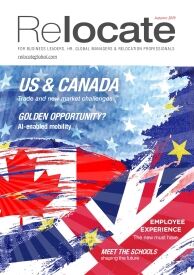Providing an excellent relocation experience
What are the challenges affecting international assignment success? How can companies fully prepare and support their staff before and during their relocation?

The importance of ongoing relocation support
There have been great technological advances that help to facilitate the assignment process. But let’s not forget that global mobility is in the business of moving people and it is up to us to ensure that they are having a positive experience.According to a survey of FOCUS members taken in May 2019, 50% of respondents said that it took them between 6-12 months to feel settled in their new location. Generally, a lot of support is provided at the initial phase of the assignment. Frequently, however, questions or concerns come up a few months into the relocation when support is no longer available.So what can we do? There is not a magic formula to ensure the success of an international assignment, but it is important to recognise that if support is available throughout the assignment, the family’s needs can be addressed promptly, thus contributing to a positive experience for both employee and partner.Provision of that support can be given in many ways depending on each individual’s needs. Let’s examine personal, dual-career and financial challenges, which may be impeding assignment success.Related articles:
Family support and its relocation policy implications
What to know about deploying your first expat... and beyond
Personal challenges
These are inevitable during an international move and it is vital to set realistic expectations from the outset. The first impression is the one that will last, so the tone is essential – be realistic, but positive.Most people give little thought to who they are and where they come from until they arrive in a new country. It is important to take in the new culture – behaviour, environment and even the way people dress. While cultural training may be provided by the company, the working partner may not feel they need it if they have been regularly travelling to the new destination; however, the partner and children will benefit immensely and this should be strongly recommended.It is also important to establish open lines of communication with all parties involved in the relocation. This will help to prevent misunderstandings and enable all to meet the expectations that have been set. If possible, understand with whom to communicate which issues, i.e., the father is responsible for the children’s education, the mother is responsible for the shipment and the move.Dual-career challenges
Over the past few years, we are seeing more and more dual-career couples taking on international assignments. Our experience at FOCUS in the past five years is that we have seen a 15% increase in the number of male accompanying partners. Many companies are experiencing a similar trend.Given that the partners are highly educated, career-focused and independent, often they are unwilling to give up their career to follow their spouse. This will be even more prominent when moving to a country that has barriers to employment for the partner, such as a lack of access to a work permit, a labour market that doesn’t recognise their qualifications, the job-seeker’s inability to commit to long-term job tenure, as well as language and cultural differences.Download our family support and dual-career factsheets
There are formal options for assistance, which include seminars and workshops to give job seekers all the practical knowledge needed in their new country for a successful job search. Examples include outplacement agencies, NetExpat or FOCUS’ Career Development Programme. Additional solutions include one-to-one career coaching and subscriptions to expat jobs boards, as well as partner support networks such as the International Dual Career Network (IDCN), a collaboration among a group of multinational companies that make job openings available to the partners of assignees in other participating organisations.Let’s not forget there are language and cultural training programmes that are often underestimated, but can be a vital tool in ensuring that a candidate is competitive in the local market. A ‘top-up’ cultural training session, once the family is on location, often crystallises all that has been previously mentioned and they are now able to relate it to real-life experience.
Financial challenges
We know very well that an international assignment is a substantial investment. Not so long ago, every person expressing an interest in overseas work would be sent abroad and it would be seen as career development. Now, every expatriation is carefully considered, as it is a significant expense to the company.While benefits may seem expensive, they play a vital role in ensuring a positive experience. The assignee must feel they have the equivalent standard of living to what they had in their home country and provision of benefits such as rent, tuition, career support and health insurance can help to ease the transition. Having the financial flexibility to address any unforeseen situations may be a necessary tool to ensure that the assignment continues to be a success. Trying to provide the bare minimum or a low-cost solution may be a false economy if the family doesn’t settle well and insists on going home.The following simple-yet-effective suggestions may help assignees and their families to readily adjust to the new location:- Don’t compare to your home country: everything will be different, not better or worse, just different
- Be kind to yourself: it will take time to put all the pieces together in the new location and culture
- Have an action plan to address the different challenges: you can’t solve all problems simultaneously
- Invest time in networking both social and professional: be proactive and don’t turn down an invitation
- Ask for help: you aren’t alone.
FOCUS is a unique community for expats and international professionals living in the UK. FOCUS members are instantly connected to like-minded people and gain access to resources, events and career seminars to enhance their international experience.FOCUS is a non-profit organisation and have been providing Award-winning support to expatriates for over 30 years. Based in central London, their multinational staff have first-hand experience of living abroad and tailor all information to the specific needs of each member.
Subscribe to Relocate Extra, our monthly newsletter, to get all the latest international assignments and global mobility news.Relocate’s new Global Mobility Toolkit provides free information, practical advice and support for HR, global mobility managers and global teams operating overseas.
 Access hundreds of global services and suppliers in our Online Directory
Access hundreds of global services and suppliers in our Online Directory ©2019. This article first appeared in the Autumn 2019 edition of Relocate magazine, published by Profile Locations, Spray Hill, Hastings Road, Lamberhurst, Kent TN3 8JB. All rights reserved. This publication (or any part thereof) may not be reproduced in any form without the prior written permission of Profile Locations. Profile Locations accepts no liability for the accuracy of the contents or any opinions expressed herein.
©2019. This article first appeared in the Autumn 2019 edition of Relocate magazine, published by Profile Locations, Spray Hill, Hastings Road, Lamberhurst, Kent TN3 8JB. All rights reserved. This publication (or any part thereof) may not be reproduced in any form without the prior written permission of Profile Locations. Profile Locations accepts no liability for the accuracy of the contents or any opinions expressed herein.


































